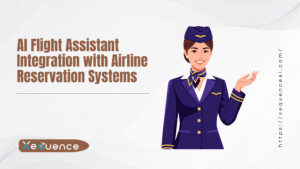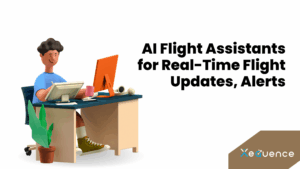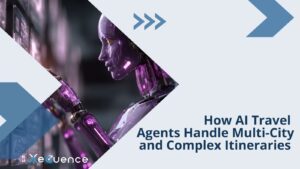How is AI changing the travel and tourism industries?
- March 11, 2024
- Suraj Kumar
- Gen AI, Technology, Travel

AI helps companies to enhance consumer experiences, optimize offerings
The travel and tourism business is a vibrant, ever-evolving field with both enormous potential and difficult obstacles. Innovation and adaptation are essential for survival and growth in the face of constantly changing customer demands, fierce competition, and the ongoing effects of world events. Companies in this industry are realizing more and more that in order to remain competitive and meet the needs of contemporary travelers, they must use cutting-edge technology. AI is useful as it has the potential to solve a lot of the industry’s present problems because of its capacity to analyze enormous volumes of data, forecast trends, automate processes, and provide individualized experiences.
Artificial intelligent in railways
AI has created a variety of new approaches to ensure railway safety. Real-time data analysis allows systems to detect possible threats and notify operators. AI-powered cameras are preventing derailments by monitoring conditions and warn operators to any anomalies. Efficiency is an important KPI for rail firms and one area where AI may flourish. By accessing data on passenger demand, train schedules, and track availability, AI systems may identify the most efficient resource use. This can reduce delays and enhance the overall customer experience.
Artificial intelligent in aviation industry
Bots can route visitors to specific services or outlets, provide flight information updates, and so on, freeing up staff time to focus on other valuable tasks and decreasing human touch. Chatbots and customer service automation are human-like, understanding simple questions and responding in a casual, conversational tone. Baggage screening efficiency improves significantly using an Artificial Intelligence-driven robotic-assisted system, swiftly identifying and redirecting high-risk luggage for further inspection. Today’s AI-powered facial recognition technologies for live video provide insights into how people move through the room and offer considerably faster access.
ChatGPT and other language-learning AI models are generally adept at spreading massive amounts of information in order to produce relevant and, for the most part, correct results almost instantaneously.
Artificial intelligence in hotels
Personalisation is one way in which artificial intelligence can improve the customer experience. AI technologies simplify the process of recording and updating consumer preferences. Chatbot for hotels makes precise record-keeping easier, allowing you to track previous purchasing habits, likes and dislikes, previous services used, degrees of satisfaction, and more. Many back-office processes can be automated, lowering human error, boosting efficiency, and freeing up workers for more vital responsibilities.
How Artificial Intelligence is facilitating the travel and tourism industry?
It helps in Language Translation
Clients generally prefer local language to communicate creating a challenge of organization. AI-driven translation services facilitate smooth communication, making it easier for tourists to get around in other countries. AI helps with understanding local menus, signs, and conversations, enhancing the cultural experience by offering a comprehensive awareness of the location. In the travel sector, artificial intelligence boosts tourists’ self-assurance, enabling them to ask for assistance in local activities and traverse unfamiliar areas with ease.
Fraud Detection
Real-time fraud detection and pattern analysis of booking trends can be achieved by AI automation, safeguarding both tourists and travel-related enterprises. Businesses can assist in identifying possible fraudsters prior to their reservations or insurance benefit claims by utilizing predictive analytics.
Improved Travel Safety and Security
By concentrating on strong security measures, AI-centric systems may effectively identify possible risks at tourism attractions. By employing real-time surveillance, it can also identify questionable actions and highlight potential fraud.
With the introduction of cutting-edge technology and intelligent systems, artificial intelligence has greatly improved travel safety and security. The ability to identify threats and analyze risks has significantly improved. With its cutting-edge screening procedures, AI has completely transformed airport security. For instance, automated facial recognition systems can reliably identify and validate travelers, lowering the possibility of identity theft and enhancing security as a whole.
Dynamic Pricing
A sophisticated tactic employed in the travel business, dynamic pricing allows costs of hotels, airlines, and other services to be changed in real-time based on a variety of criteria. In order to estimate demand, spot possible price swings, and maximize profits for travel agencies, artificial intelligence analyzes enormous volumes of data and applies algorithms. AI in hotel industry gather and evaluate information from a variety of sources, including as booking websites, surveys, real-time data, and past travel experiences. The common price optimization techniques that optimize tourism enterprises’ revenue while maintaining their competitiveness in the market are demand elasticity, rival pricing, and marginal cost.
Customized Travel Recommendations
Artificial intelligence makes recommendations for vacation locations, lodgings, and itineraries based on a vast quantity of data, including search activity, social media interaction, and past travel experiences. These recommendations are customized to each traveler’s distinct interests and preferences. Planning could be streamlined by artificial intelligence, saving time and effort.
Weather and Traffic Prediction
When compared to conventional forecasting methods, the integration of artificial intelligence enables travelers to examine data like weather trends and traffic volume, resulting in more precise and localized predictions. In proactive risk management, such as transportation rerouting, scheduling adjustments, and inconvenience, potential safety danger, and cancelation mitigation, artificial intelligence is particularly helpful.
Virtual Travel Assistants
AI powered travel assistants reform the tourism sector by offering customized travel experiences. VTAs provide help around-the-clock, responding to inquiries, fixing problems, and giving out information and updates in real time.
Enhanced Customer Experience
AI’s personalized suggestions, 24/7 multilingual concierge assistance, predictive analysis, effortless booking, and adaptable travel options can enhance the overall customer experience. By harnessing the capabilities of AI, the travel and tourism sector has the opportunity to improve efficiency, sustainability, and satisfaction for every traveler.
Automated Travel Experience
By managing travel logistics, cutting down on planning time, and offering real-time information and support, artificial intelligence is opening the door to a more automated and seamless travel experience. Businesses may free up employee time and resources for higher-level work by using artificial intelligence to automate administrative duties like customer service questions, booking administration, and data analysis. For tourist-related enterprises, automating processes can drastically save operating expenses, resulting in higher profitability and better resource allocation.
AR/VR Experience
There are several benefits to AR and VR, like virtual tours of sites that give visitors a true sense of the area, activities, and ambiance. VR brochures, which feature stunning images, interactive features, and 360-degree views, may make the location come to life. Utilizing AR and VR technologies, travelers can engage with the history, culture, and natural landscapes of a destination in captivating ways, enhancing the overall experience and making it both memorable and enjoyable.
The final words
AI is transforming the travel and tourism sector by giving companies the power to enhance consumer experiences, optimize their offerings, and make more informed decisions based on data. In addition to offering customized recommendations, AI is enhancing traveler safety and security. The hotel sector is also utilizing AI-powered solutions to increase employee productivity and automation while offering individualized services to clients. AI is poised to further transform the sector and present firms with possibilities to seize.
Recent Posts
5 Myths About AI in Hospitality Operations | Facts Every Hotelier Should Know
Newsletter
Get regular updates on data science, artificial intelligence, machine
You may also like

Al Flight Assistant Integration with Airline Reservation Systems

The Future of Hospitality Operations: AI Trends to Watch

AI Flight Assistants for Real-Time Flight Updates, Alerts




